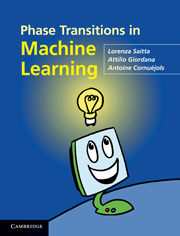Book contents
- Frontmatter
- Contents
- Preface
- Acknowledgments
- Notation
- 1 Introduction
- 2 Statistical physics and phase transitions
- 3 The satisfiability problem
- 4 Constraint satisfaction problems
- 5 Machine learning
- 6 Searching the hypothesis space
- 7 Statistical physics and machine learning
- 8 Learning, SAT, and CSP
- 9 Phase transition in FOL covering test
- 10 Phase transitions and relational learning
- 11 Phase transitions in grammatical inference
- 12 Phase transitions in complex systems
- 13 Phase transitions in natural systems
- 14 Discussion and open issues
- Appendix A Phase transitions detected in two real cases
- Appendix B An intriguing idea
- References
- Index
5 - Machine learning
Published online by Cambridge University Press: 05 August 2012
- Frontmatter
- Contents
- Preface
- Acknowledgments
- Notation
- 1 Introduction
- 2 Statistical physics and phase transitions
- 3 The satisfiability problem
- 4 Constraint satisfaction problems
- 5 Machine learning
- 6 Searching the hypothesis space
- 7 Statistical physics and machine learning
- 8 Learning, SAT, and CSP
- 9 Phase transition in FOL covering test
- 10 Phase transitions and relational learning
- 11 Phase transitions in grammatical inference
- 12 Phase transitions in complex systems
- 13 Phase transitions in natural systems
- 14 Discussion and open issues
- Appendix A Phase transitions detected in two real cases
- Appendix B An intriguing idea
- References
- Index
Summary
In this chapter we introduce the main topic of this book, namely machine learning. In order to make the book self-contained, a brief introduction to the subject is presented.
Learning
The word learning is generally associated with a category of performance, as in learning to play chess or learning to program computers, or with a corpus of knowledge, as in learning geometry. It also often comes in association with some mechanism, as in learning by doing, learning by explanation, learning by analogy, learning by trial and error, and so on.
Learning appears under seemingly very different guises: from habituation (the reduction in sensibility or attention with the repetition of a situation or in problem solving), imitation, rote learning, discrimination (the ability to distinguish one type of input from others), categorization (constructing categories from observations of the environment), to learning whole bodies of knowledge or even discovering theories about the world.
Ubiquity of learning
Since learning (throughout evolution or through cultural and individual acquisition) is at the source of all behavioural and cognitive capabilities in natural systems, as well as in many artificial ones, it is no surprise that it displays such a wide variety of appearances and mechanisms. There are, however, some common aspects and ingredients that underlie many of these diverse manifestations of learning.
- Type
- Chapter
- Information
- Phase Transitions in Machine Learning , pp. 92 - 123Publisher: Cambridge University PressPrint publication year: 2011
- 2
- Cited by



